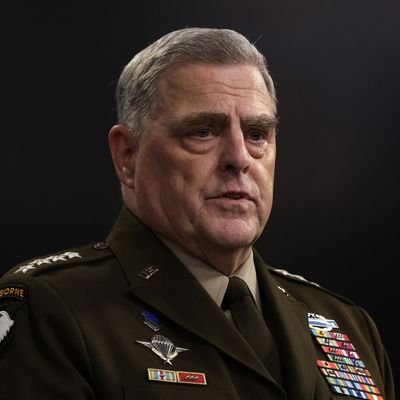
Like many books about the Trump administration before it, Bob Woodward and Robert Costa’s latest on the cacophony in the last White House has stirred up a bit of controversy — this time surrounding a reported incident in which chairman of the Joint Chiefs of Staff General Mark Milley called up a leading general in the Chinese military, informing his counterpart that the outgoing president would not attack the country in his waning days in charge. But unlike past scandals related to reporters writing Trump books, the controversy extends beyond partisan outrage and journalists holding onto facts to market their own work. As Woodward and Costa’s reporting faces scrutiny and conservatives call for General Milley to be tried for treason, below is everything you need to know about the controversy surrounding Peril.
What does the book allege?
According to Woodward and Costa, who are both with the Washington Post, Milley circumvented Trump’s authority by calling General Li Zuocheng of China’s People’s Liberation Army in October 2020 and in January, informing him that there would not be a U.S. attack on the nation with the world’s largest standing army. And if there were a strike, Milley reportedly told Li that he would give him a call “ahead of time.”
The calls reportedly came after Milley learned last October that Chinese officials were worried about a preemptive attack amid an escalation of the trade war. The first contact took place days before the election, and the second occurred two days after the insurrection, when Milley was worried that Trump would go “rogue.” He also told House Speaker Nancy Pelosi that “there’s not a snowball’s chance in hell this president, or any president can launch nuclear weapons illegally, immorally, unethically without proper certification,” according to Peril. On the day of the second call, Milley also gathered senior military officials at the Pentagon for a private meeting, where he informed them not to follow through on any orders without his supervision. “No matter what you are told, you do the procedure,” he reportedly said. “You do the process. And I’m part of that procedure.”
The claims as they stand in the book resulted in Republicans calling for the chairman of the Joint Chiefs of Staff to be tried for treason for his alleged act of insubordination.
How has the Pentagon responded?
In a press briefing, a Pentagon spokesperson confirmed the conversation between Milley and Li in January, saying that the pair conferred “in order to maintain strategic stability.” When asked about calls for his firing and a treason charge, the spokesperson dismissively said “oh my goodness,” adding that these calls are a “function of the job,” suggesting that the reporting exaggerated the extreme nature of Milley’s outreach.
Joint Staff spokesperson David Butler added that “all calls from the Chairman to his counterparts, including those reported, are staffed, coordinated and communicated with the Department of Defense and the interagency.”
When asked about the allegations on Wednesday, President Joe Biden told reporters he had “great confidence” in the general, who remains the chairman of the Joint Chiefs of Staff, the body made up of the leaders of the armed forces. Milley has also denied wrongdoing and will testify before the Senate Armed Services Committee on September 28.
What has follow-up reporting revealed about the allegations?
While initial outrage over the incident focused on Milley’s alleged act to undermine the president, the flack is now returning to the sender. On Wednesday, Politico reported that a Defense official familiar with the calls described Woodward’s and Costa’s depiction of them as “grossly mischaracterized.” Just as the Pentagon spokesmen confirmed on the record, this official said that coordination with foreign military leaders is not uncommon. Another former Defense official also contested the description of Milley acting on his own, when he actually asked permission from acting Defense Secretary Chris Miller before calling the Chinese general. After the call, he also briefed Miller’s office about its contents, though Miller told Politico that he didn’t “recall the specifics” of the post-call briefing. “It was more perfunctory/routine,” he said.
In a statement provided to Politico, Woodward and Costa said that they “stand by our reporting.”






























